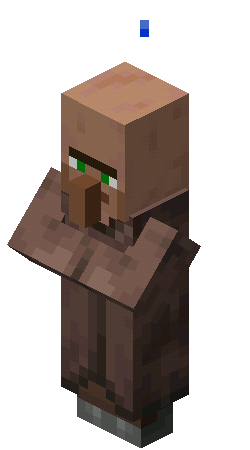Relocating Villagers in Minecraft: A Comprehensive Guide

Ever find yourself staring at a haphazardly generated village in Minecraft, wishing you could just *shift* things around a bit? Like, maybe scootch that grumpy librarian closer to your enchanting setup, or create a charming little marketplace near your base? You’re not alone. The urge to curate your Minecraft world is a powerful one, and thankfully, villager relocation is totally within your grasp.
Relocating villagers in Minecraft is all about strategic planning and understanding villager behavior. Whether you're aiming for aesthetic improvements, creating a bustling trading hub, or simply rescuing villagers from a zombie siege, knowing the right techniques is key. This comprehensive guide will delve into the various methods you can use to move villagers, from simple nudges to more complex transportation systems.
The ability to move villagers wasn't always a feature in Minecraft. In earlier versions, villages were static entities, and players had limited interaction with their inhabitants. However, as the game evolved, so too did the dynamics of village life. The introduction of trading and breeding mechanics made villagers a valuable asset, and with that came the need for more control over their placement.
Successfully relocating villagers offers several advantages. It allows you to consolidate your trading operations, making it easier to access the specific goods and services you need. It also enhances the aesthetic appeal of your world by allowing you to design custom village layouts. Perhaps most importantly, it gives you the power to protect your villagers from hostile mobs and environmental hazards, ensuring the prosperity of your burgeoning community.
However, moving villagers comes with its own set of challenges. They can be stubborn, easily distracted, and prone to wandering off if not carefully managed. Furthermore, certain relocation methods can be time-consuming and resource-intensive, requiring careful planning and execution. But don't worry, we'll cover all the nuances, tips, and tricks to help you navigate these potential pitfalls.
One of the simplest ways to move a villager short distances is by gently nudging them in the desired direction. This method requires patience and a bit of finesse, as villagers can be easily spooked and prone to erratic movements. Another option is using boats or minecarts. Boats are ideal for transporting villagers across water, while minecarts provide a faster and more efficient way to move them over land.
For long-distance relocation, the Nether portal is your best bet. By creating a portal near your village and another at your desired destination, you can quickly and safely transport villagers across vast distances. Just make sure to guide them carefully into the portal, as they can sometimes be hesitant to enter.
Advantages and Disadvantages of Moving Villagers
| Advantages | Disadvantages |
|---|---|
| Consolidated Trading Hub | Time-Consuming |
| Aesthetically Pleasing Villages | Resource Intensive (for some methods) |
| Improved Villager Safety | Villagers Can Be Stubborn |
Best Practices:
1. Plan your village layout in advance.
2. Use rails for minecart transport.
3. Light up the path to prevent spawning of hostile mobs.
4. Build fences to contain villagers during transport.
5. Be patient and persistent.
Real Examples:
1. Creating a centralized trading hall near your base.
2. Relocating villagers to a safer, more defensible location.
3. Building a custom village with specific amenities.
4. Rescuing villagers from a zombie-infested village.
5. Establishing a breeding program to increase your village population.
Challenges and Solutions:
1. Villagers getting lost: Build fences or walls to contain them.
2. Villagers refusing to enter boats or minecarts: Use leads to guide them.
3. Villagers falling out of minecarts: Ensure smooth tracks and avoid sharp turns.
4. Villagers dying during transport: Protect them from hostile mobs and environmental hazards.
5. Villagers getting stuck in the Nether: Ensure proper portal placement and clear the area around the exit portal.
FAQ:
1. Can you move villagers with leads? Yes, leads are a useful tool for guiding villagers.
2. How do you move a villager's bed? You can break and replace the bed.
3. Can you transport villagers through the End portal? No.
4. Do villagers need beds to breed? Yes.
5. How do you cure a zombie villager? Use a weakness potion and a golden apple.
6. What do villagers trade? Various items depending on their profession.
7. Can villagers despawn? No, unless they are killed or traded away.
8. How do you assign a villager a profession? Provide a job site block.
Tips and Tricks: Use name tags to prevent villagers from despawning. Create a dedicated villager breeding area. Build iron golems to protect your villagers.
Relocating villagers in Minecraft is a crucial aspect of building thriving communities and customizing your gameplay experience. Whether you're creating a meticulously planned village or simply ensuring the safety of your virtual citizens, the methods and strategies outlined in this guide will empower you to manage your villager population effectively. From simple nudging to complex nether portal transportation, the power to shape your Minecraft world is in your hands. Embrace the challenge, experiment with different techniques, and create a village that truly reflects your vision. Remember, a happy villager is a productive villager, and a well-organized village is a testament to your ingenuity and dedication to the art of Minecrafting. So, grab your pickaxe, gather your resources, and embark on the exciting journey of villager relocation. The possibilities are endless, and the rewards are well worth the effort.
Conquer the ca dmv license renewal appointment tips
Choosing the right coway water filter your guide to pure water
Leather car seat mold removal guide













